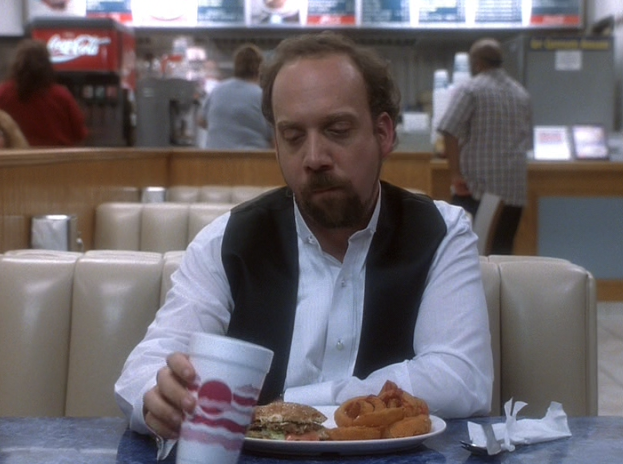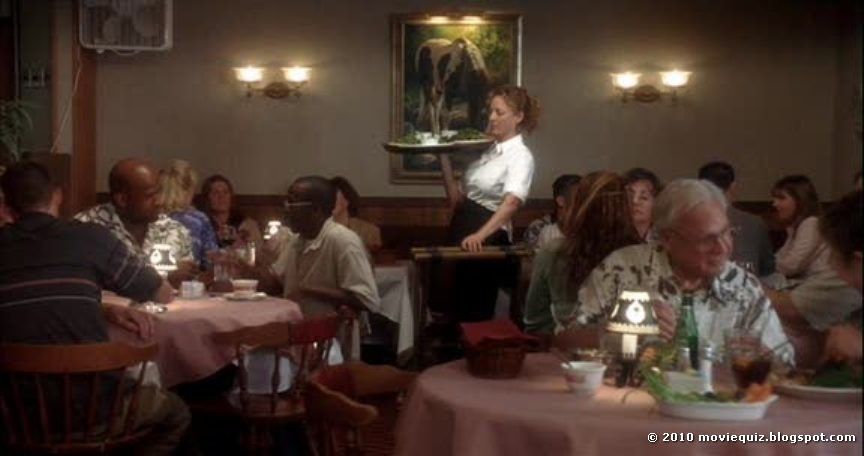I’ve
been struck with the unusual-for-me desire to get my butt to the cinemas to
enjoy the pickings for 2013. In these,
the first three days of 2014, I’ve done two double-headers at my favorite
cinema that shows current releases. And,
because I’m still me, I can’t simply “watch” these movies, I have to also think
about and analyze them. But four
1000-word-plus reviews is a bit too daunting, especially when my blogging
skillz are a bit rusty. So I figured I’d
do a briefer review of these four flicks.
Up
first:
Mandela:
Long Walk to Freedom
2013
Director: Justin Chadwick
Starring: Idris Elba, Naomie Harris
The
utterly inevitable movie of Nelson Mandela’s life hits the big screen with
brilliant casting being the best thing going for it. As my students are wont to say, not gonna
lie, the only reason I went to see it was Elba.
Idris Elba as anything is automatically worth it; the man is a force of
nature, and him as Mandela seemed too good to pass up.
The
film follows a mostly straightforward biographical movie outline, starting with
voiceover reminiscences to golden memories of youth, then plunging us almost
immediately into young man Mandela’s difficulties and following, in a linear
fashion, through the imprisonment we all knew was coming, as well as the
release and election. We also follow the
life of Mandela’s second wife Winnie (Harris), who stands by her man while he’s
in prison by continuing to lead the revolution movement, even to the point of
becoming militant. Director Chadwick
makes an effort to humanize the mythic Mandela, showing him as a red-blooded
young man who was a hound dog with the ladies and not exactly husband of the year
to his first wife.
Elba
does not disappoint as Mandela, filling the screen with rage, righteousness,
and then powerful pacifism, and he is easily the strongest aspect of the
film. Harris is also very good as the
sweet yet steely Winnie who must also weather great injustices in the
family-lead fight to end apartheid. But
the performances are all I can truly recommend; the story feels too
disconnected to my liking. Years pass,
peoples’ opinions fundamentally change, and we are given little to no reason
for it. The resolution of the film feels
like a hasty mash-up, as if the director realized he had painted himself into a
corner of racial warfare and had no idea how to get out. Now granted, this was undoubtedly a similar
situation to the feeling in South Africa at the time, but the 180 that this
film pulls feels more than a little incongruous.
Worth
it for the performances, but not a hearty recommendation from me. I will add, for honesty’s sake, that biopics
are really not my thing, not in the slightest, so I was predisposed to not
being completely moved by this one to begin with.
Arbitrary
Rating: 6/10
Philomena
2013
Director: Stephen Frears
Starring: Judi Dench, Steve Coogan
After
my final statement about Mandela having a strike against it simply because it
wasn’t my type of film, I will now own up and say that going in, I knew Philomena
WAS my type of movie, and after seeing it, yes, most definitely, it’s my type
of flick, for sure. Objectively, though,
I do believe Philomena is a stronger film (although, probably not as much
stronger than Mandela as my rating will reflect).
Judi
Dench plays the titular character, a silly, elderly lady who loves her salad
buffets with toasty croutons, snacks on the road, and frivolous romance
novels. But Philomena’s secret of fifty
years, that she gave birth to a baby boy when she was just sixteen years old at
a Catholic nunnery in Ireland who was then later adopted against her will, is
gnawing at her. With the help of
recently-unemployed big time journalist Martin Sixsmith (Coogan), who needs a
human interest story to set him back on track, she goes about finally trying to
track down her long lost son.
Everyone
knows that Judi Dench can act circles around pretty much anyone, but what’s
unusual in her performance here is how utterly ordinary and regular Philomena
is. I’m used to Judi Dench playing
either someone of great esteem (a la Shakespeare in Love) or someone with
something unusual about them (a la Iris).
Philomena is neither. Yes, you
can certainly argue that having a long lost son is unusual, but after seeing
the film, Philomena still feels ordinary.
She’s just a fussy, aging Irish Catholic woman who colors her hair and
wears old lady clothes, and Dench does her proud, giving her grace and humanity
and a full range of emotions alongside all her silliness.
Maybe
more surprising than Dench playing such a regular character is the fact that
Steve Coogan can play a straight man (in the comedic sense, not the sexual
sense). For everything that Philomena
loves about ordinary, middle-class comforts, Martin is used to the finer
things. As a former international political
journalist, Martin is an Oxford-educated, BMW-driving,
boutique-restaurant-frequenting perfect foil to Philomena. Watching her get on his nerves and under his
skin is half the film, but it’s an enjoyable relationship to explore, as Dench
is careful to never let Philomena get too silly, just as Coogan is careful to
keep Martin from being too snobby or curmudgeonly.
Because
ultimately, silly caricatures aside, this film has tremendous depth of
heart. The story that is explored, about
the long lost son, is done so with as few clichés as I’ve ever seen. When you think you know where the story is
headed, it throws you an enormous curveball, one that requires both lead actors
to show us new aspects of their characters, or expand tremendously on ideals
that have already been established. It’s
sweet and funny but never cloying, never overly sentimental.
To
reiterate, this is very much my kind of film.
The wry British sense of humor is on full display, it touches without
manhandling you, and who knew Steve Coogan could hold his own against
powerhouse Dench.
Arbitrary
Rating: 9/10.
American
Hustle
2013
Director: David O. Russell
Starring: Christian Bale, Amy Adams,
Bradley Cooper, Jennifer Lawrence
Perhaps
the buzziest of the films I’ve seen recently, American Hustle is
certainly riding a wave of good press and award nominations. Without
necessarily meaning this as an insult, American Hustle is the type of film
meant to appeal to Academy voters. I won’t
use the term Oscar-bait due to its negative connotations, but American
Hustle feels exactly the sort of edgy, flashy, seriocomic film that the
Academy can feel terrifically justified in nominating. “Look how hep we are, we’re recognizing American
Hustle!” they proclaim with glee.
Overweight
and balding Irving (Bale) is a con artist working out of New York who falls
madly in love with Sydney (Adams), a beautiful creature who eagerly joins him
in his cons. The fact that Irving is
already married to Rosalyn (Lawrence), a slightly crazy hausfrau, is a minor
hiccup. But when they are nabbed by an
FBI agent (Cooper), they both agree to his terms of running a con to bring down
some politicians in exchange for a reduced sentence. But really, when politicians, the mob, the
FBI, and con artists are all thrown into the mix, who’s conning who?
The
style of American Hustle was probably my favorite part. The late seventies, in all its glitzy,
superficial glory, is on full display, and we have our fill of overdone hair,
polyester shirts, and New Jersey accents.
Amy Adams is terrifically sexy in shirts and dresses that plunge to her
navel, and Jeremy Renner as a Jersey politico happily prances around in pale
blue tuxedos with frilly sleeves. The
film is dressed in golds and browns, giving the entire story an air of wistful
nostalgia, as though our con artists are recounting their glory days.
The
performances are, again, top notch.
Particularly delightful was Jennifer Lawrence as Rosalyn. Unhinged yet manipulative all at the same
time, Lawrence pulls it off and then some.
She’s definitely making a strong case for being up for the big prize for
a second year in a row.
However,
there’s something that never quite coalesces in American Hustle. Like Mandela, the finale feels somehow
inadequate to the tremendous build up it is given. Is it about the con or is it about the drama
of the characters at hand? Frankly, the
film waffles on this question, and ultimately, I felt there were unanswered
issues on both of those sides.
I
enjoyed American Hustle, but not absolutely. It is a good film, a strong film, but it didn’t
blow me away.
Arbitrary
Rating: 8/10
Nebraska
2013
Director: Alexander Payne
Starring: Will Forte, Bruce Dern, June
Squibb
Full
disclosure: I am a slavering little Alexander Payne fangirl, due in no small
part to the fact that I’ve now met him twice, have his autograph, and a picture
with him. I’ve even spoken to him about
his filmmaking style. I enjoyed his
films before I met him, but now? Now I’m
a devotee for life. Given that he only
makes a film once every two to three years, it was an utter no brainer for me
to see his latest. Spoiler: I loved Nebraska. But then, frankly, I was always going to love
Nebraska.
David
Grant (Forte) sells speaker systems and electronics in a strip mall in
Billings, Montana. His father Woody
(Dern) is an alcoholic and not altogether with it retired auto mechanic. When Woody gets one of those magazine promo
letters proclaiming that he’s won one million dollars (provided his number
matches and he buys some magazine subscriptions), all he sees is the one
million dollars. Convinced he just hit
it big, he becomes obsessed with the idea of getting to Lincoln, Nebraska, to
claim his winnings, and ultimately, a harassed David agrees to take him. On the way, they stop in Hawthorne, Nebraska,
the tiny near-ghost town where Woody grew up.
Woody visits with his old family and friends, all the while spreading
the news about his apparent good luck.
There
are so many things I adore about Alexander Payne, and this film has them
all. I was amused as the credits rolled
at the end, because Nebraska was precisely what I expected it to be given what I
know about Payne’s filmography. I don’t
think this is a bad thing; on the contrary, I think it means that Payne knows
clearly who he is as a filmmaker and can deliver his message in a vivid and
consistent manner.
I
have decided that Alexander Payne is in love with the American working class,
but he is also determined to show them as they are, not as they think they are
or wish to be. There is so much truth in
Nebraska
in this regard that the number one criticism I have seen leveled at the film is
that Payne is mocking the small town folk of his film. I could not disagree more. There are some less-than-positive characters
and moments in Nebraska, but nothing ever feels as though it is played for
cheap laughs. Instead, everything feels…
real. Painfully real, but thoroughly
real. I went to college in an area not
unlike those shown in Nebraska, and I visited friends’
homes who lived close by whose families behaved precisely – and I do mean
PRECISELY – like the family in Nebraska. That’s why I don’t think there is any mocking
meant here; I’ve seen these scenes before, I’ve seen these places before, just
never on the big screen.
Furthermore,
Payne himself is from Nebraska. He shot
his first feature Election (the film that made me a fangirl of his to begin
with) in Nebraska, and when I’ve heard him speak, he always spoke lovingly of
the area in which he grew up. A year ago
when I last saw him, he announced this film and I could hear how excited he was
to make a film about his home. I see
affection, not mocking, in Nebraska, culminating in the gently
poignant yet utterly devastating finale sequence. There is so much love in the ending of the
film that, while Payne undoubtedly calls out the less than savory characters in
the story, showing them for the superficial assholes they ultimately become, he
also knows there are heroes in his story, and they are glorious. Mocking?
Not in the slightest. Loving yet
careful not to romanticize? Absolutely.
Apart
from the simple characters who reek undoubtedly of truth, my favorite aspect of
Payne’s work is his production design.
Or perhaps, lack of production design.
What I passionately adore about Payne is his devotion to filming on real
locations, locations that haven’t been meticulously manicured. He uses real houses, real motels, real bars,
real chain restaurants, and his extras are real people. When he does need to film on a set, more often
than not, the set is modeled on an actual house or room. There are knick knacks everywhere, dirty
dishes in the sink, cracks in the driveway, leaves in the pool, and scratches
on the linoleum. It’s not that his films
are dirty or dank; it’s that they’re fucking REAL. The living room looks like a real living
room, warts and all. I’ve always noticed
and responded to this in his films, and it’s what I had a chance to ask him
last time I saw him. When I mentioned
this to him, that I loved that he uses real places, I remember so vividly that
he smiled broadly, and responded with “I don’t understand why we need to
prettify everything.” Indeed.
While
Payne plays the utter ordinariness of the world around his characters in most
of the film as flat and banal, he also shoots the film occasionally with great
beauty. When the film reaches its
emotional climax, suddenly the everyday locations around seem majestic. Payne lingers on a shot of a wide open field,
the sun breaking through a magnificent cloud formation. Because truly, there is extraordinariness in
the everyday.
Bruce
Dern as Woody is brilliant in quietly showing us a sad old man desperately
clinging to one last wish for glory. Are
we annoyed with Woody or do we pity Woody?
Well, both, sometimes at the same time.
As David discovers more about his father on this road trip, we see far
more in the simple facial expressions than the curmudgeonly drunk we meet at the
beginning. Will Forte is easily an
unusual casting choice, as he is known almost completely for broad comedic
work, playing a caricature of a caricature.
Here, though, he carries off a decidedly downbeat performance, following
in the footsteps of Jack Lemmon in The Apartment. It’s not as brilliant a performance as Lemmon’s
is, but I can see the influence, and I imagine Forte being inspired by Lemmon
in this role.
I
knew what to expect from Nebraska, so when I found myself
sobbing rather uncontrollably at the quiet finale of the film, I wasn’t
surprised in the least. I was happy,
though; happy that Payne had delivered once again on a simple human story, relatable
to the last, that kept me happily engaged throughout its entirety and then
packed an inevitable punch at the end.
Arbitrary
Rating: 9.5/10. The only thing I can
level against Nebraska is that the pacing isn’t always as tight as it could
be, and it drags a bit in the middle.
But in terms of what I want from Alexander Payne, Payne proves that he
knows how to deliver it in a mature and confident manner. I also recognize that if Payne’s previous
films haven’t floated your boat, you will undoubtedly find Nebraska incredibly
grating.
Up
next for Siobhan: eagerly looking forward to Her being released wider
next weekend. I might make an effort to
see Inside
Llewyn Davis as well. Might try
to catch Gravity when it comes to the second-run theater in town. And of course, whenever The Grand Budapest Hotel
finds its way to my local theaters, I’ll be there with bells on. I’ll also be looking out for Blue
is the Warmest Color playing any wider, and I’ve got my eyes peeled for
whenever Walesa: Man of Hope plays around here. Because I NEED to see that movie.
Frankly,
it’s been rather lovely seeing some more current release films in theaters
again. I do love this time of year for
current releases, when the theaters are full of films trying their hands at
Oscar nominations, when small character-centric comedy dramas are the order of
the day rather than big blow ‘em up action flicks.
In
terms of 1001 Movies, my job is… more under control now than it was in the
fall. I’m looking to recommit myself, in
the non-sanatorium sort of way, to blogging and The Club.
Oh,
and in a personal plug, I’ll find out end of January/beginning of February if
my proposal for presenting at a national conference this summer was
accepted. Personally, I think my
workshop idea is pretty darn awesome, but still, wish me luck.
OH,
and my old laptop finally started crapping the bed in December, so this entire
review is coming to you from my bright, shiny, brand new touch screen Asus
laptop. No optical drive, so it’s
gorgeous and light and doesn’t overheat every hour and doesn’t need to be
constantly plugged in (thus defeating the point of a laptop). YAY CHRISTMAS YAY NEW TOYS!!!














